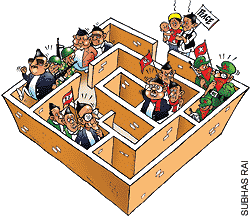 After a hard winter of frozen politics, spring brings with it the possibility of a thaw in Kathmandu. The outcome, in turn, will have consequences on the direction of the Maoist insurgency.
After a hard winter of frozen politics, spring brings with it the possibility of a thaw in Kathmandu. The outcome, in turn, will have consequences on the direction of the Maoist insurgency. The air is warming up, the king is wrapping up family obligations that had him tied up, the political parties are stirring and the Maoists are preparing for the seventh anniversary of their "peoples' war". It may look hopelessly tangled, but it could also mean that the political deadlock has a chance of getting unstuck.
Even though the Nepali Congress hasn't given up demanding a reinstatement of parliament, some kangresis now privately admit that there is no hope of the king agreeing to it. So, what the party has done is apply pressure tactics on the palace to shake things up a bit. The party modified its 50-year-old stance towards the constitutional monarchy by demanding a limit to members of the royal household allowed to have the "Shree Panch" title.
In addition, the central committee meeting on Monday also wanted the army brought under elected civilian command, and a provision in the constitution allowing for a referendum on issues of national importance.
The paradox here is that these terms have striking similarities to the Maoists' own pre-conditions for talks. Many don't trust the Maoists to stick only to these three demands when negotiations start, but the wily leader of the Congress, Girija Koirala, seems to have his reasons to firmly believe them.
This radicalisation of the Congress has had a dramatic impact across the political spectrum. Now that the Congress has put itself in direct confrontation with hardliners in the palace, being communists, the UML can't afford to look "more royal" ahead of its party convention in Janakpur next weekend. Squeezed by the palace on the one hand the Maoists on the other, the UML will be compelled to come out forcefully vis-?-vis the palace.
The Congress stance also forced the four-party meeting on Wednesday to decide to launch a united agitation against the royal move. However, the parliamentary parties are far from united. The centre right RPP and the tarai-based Sadbhavana were both kept out of the four-party meet as punishment for defecting to the king's side. And the Deuba faction of the Congress was kept out as per Koirala's wishes.
Within the RPP itself, newly-elected leader Pashupati S Rana finds himself in a tight spot. He needs to listen to the Surya Bahadur Thapa faction which wants the RPP to align with the other parties, but he also wants to make peace with the king. It is pressure from the Thapa faction that made the RPP's central committee on Tuesday give prime minister Lokendra Bahadur Chand a 15-day obey-party-or-quit ultimatum. This is a warning not just to Chand, but also to the king.
Either way, this means Chand's own future in the prime minister's seat may be numbered. And if the king wants a change of face, he can use the RPP's ultimatum as an excuse to replace a prime minister widely seen as being too weak to give proper leadership.


